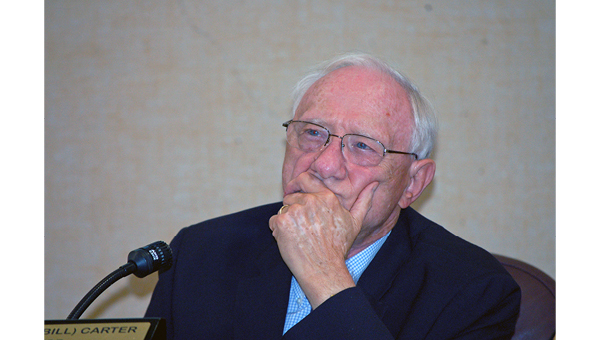You must believe
Published 9:17 am Friday, December 22, 2017
By PASTOR BRANDON YOUNG
I would like to begin the column by wishing all of you a very Merry Christmas, and a Happy New Year! My prayer is for each of you to enjoy your family and reflect upon God sending the indescribable gift to humanity: his Son, Jesus Christ. I have noticed the word “Believe” in many places this Christmas. I have seen it on T-shirts, and posted in large letters on the side of department stores. While I was visiting New York City a few weeks ago, I noticed that Macy’s has the word “Believe” in large letters on the side of their building, and immediately, I had to snap a picture of it. God has reminded me for weeks that it all begins with belief.
In fact, you must believe to become one of God’s children. John 3:16 states, “For God so loved the world, that he gave his only begotten son, that whosever believeth in him should not perish, but have everlasting life.” The word believeth in this passage of scripture means to accept something as true and genuine, having a firm or wholehearted religious conviction or persuasion by following after Christ. In other words, you accept and admit that Jesus is the Son of God, and you follow after his teachings by living like he lived. So belief is at the core of Christianity. You would think the Christmas story from the Bible would begin with belief, but in fact, it is just the opposite. Doubt makes its presence known as the angel Gabriel makes an announcement to Zacharias.
Zacharias was “righteous in the sight of God, walking blamelessly in all the commandments and requirements of the Lord” (Luke 1:6). Being righteous in the sight of the Lord means that his godliness was not an outward show, like the “righteousness” of the Pharisees, but a matter of the heart. The man walked with God and he had done so for many years. The fact that such a godly man doubted shows us that none are exempt from the problem. Doubt is a common problem for us all, and it certainly has consequences. Hebrews 11:6: But without faith it is impossible to please him: for he that cometh to God must believe that he is, and that he is a rewarder of them that diligently seek him. Only faith pleases God! We must BELIEVE!
Let’s look closer at the doubt of Zacharias. The angel Gabriel announces to Zacharias that he and his barren wife Elizabeth will have a child in their old age. Here is his response from Luke 1:18-20, “And Zacharias said unto the angel, Whereby shall I know this? for I am an old man, and my wife well stricken in years. And the angel answering said unto him, I am Gabriel, that stand in the presence of God; and am sent to speak unto thee, and to shew thee these glad tidings. And, behold, thou shalt be dumb, and not able to speak, until the day that these things shall be performed, because thou believest not my words, which shall be fulfilled in their season.” Zacharias questioned Gabriel and doubted the message sent from God! Mary had a similar experience and announcement from Gabriel, but her response was quiet different.
There are a series of parallels between the Angel Gabriel’s visit to Zacharias and his visit to Mary, all of which allude to an important aspect of Mary’s faith. For example: Both are “troubled” when the angel Gabriel approaches them (Luke 1:12, 29). Gabriel reassures both, saying, “Do not be afraid” (1:13, 30). Both are given the name of the coming child “John/Jesus” (1:13, 31). Gabriel says of both children, “he will be great” (1:15, 32). The work of the Holy Spirit is referenced (1:15, 35). Both Zechariah and Mary respond with a question (1:18, 34). You may wonder, “How does Zacharias’ question differ from Mary’s question (1:34)?” When the angel told her that she would become pregnant with Jesus, she asked, “How can this be, since I am a virgin?” The angel did not confront her for doubting. Mary is not asking “How will I know” (i.e., she’s not asking whether she can trust God’s word) — she is asking how it can be, in a spirit of amazement and wonder, rather than a spirit of doubt. Her question was more of how can this happen, and Zacharias asked the angel for a sign instead of just believing his words, and was rebuked for his doubting.
Zacharias was there that day in the temple when Gabriel, the angel who stands in God’s very presence, appeared to him and promised to give Zacharias and his wife, Elizabeth, a son. He should have been ecstatic with joy. Every day for years this devout couple had prayed, “Lord, if it would be your will, give us a son.” But that had been years ago. Now it was too late. They were both long past the time when even couples who had children were able to conceive. Zacharias had reconciled himself to reality — they were not going to have a son. He had come to terms with God over the matter: “God is sovereign. He is free to bestow His blessings on whom He wishes. For some inscrutable reason, He has withheld that blessing from us.” And now, Zacharias was not willing to open himself to the roller coaster of hopes and fears that he had long left behind. And so he doubted the word of the angel.
Zacharias was limiting God by the normal course of human nature. He and Elizabeth were too old to have children. Case closed! But he should have acknowledged, as Gabriel says to Mary, “Nothing will be impossible with God” (1:37). Zacharias is essentially asking the angel, “How do I know I can trust you? Prove it.” Furthermore, Zacharias’s only basis of doubt was his and his wife’s old age. This was a miracle for which Biblical precedent had already been set (for Abraham, for example, in Genesis 18) We cannot see the spirit behind Zacharias’ question, but God can — and on this basis, Zacharias is rebuked.
The consequences of Zacharias was muteness. Zacharias could no longer bless or instruct the people as their priest. Even worse, at the news of Elizabeth’s pregnancy, Zacharias could not audibly rejoice with her. All this because Zacharias doubted a promise from God. Look at your Bible for a moment. It has many promises from God — do you believe them? Or are you like many who believe some of the promises, but not all of the promises? It is a dangerous thing to harbor unbelief. It is a dangerous thing to doubt the truth of God’s Word. The difficulty is that we are little aware of how many Divine chastisements come upon us as a result of our unbelief. Let’s decide to believe again!
I would like to close the column with an excerpt from the book, “God on the Witness Stand”: The Holocaust is one of the terribly traumatic episodes of modern history, yet it has also yielded some astounding stories of bravery and faith. In France a Jewish family were hidden by some concerned French nationals in the basement of their house. The Jewish family waited and waited for their deliverance. At the end of the war these words were found scribbled on the wall of that basement:
“I believe in the sun even when it does not shine.
I believe in love even when it is not given.
I believe in God even when he is silent.”





